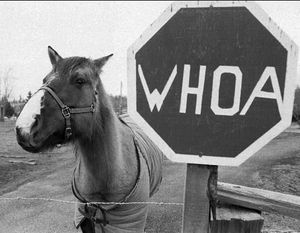Will Spokane follow San Francisco with the Idaho stop?
Bikes and stop signs are definitely not like peanut butter and chocolate.
That's why San Francisco is considering allowing cyclists to treat stop signs as yield signs, a practice commonly known as the "Idaho stop," because the Gem State has allowed such a move for decades.
San Francisco will become the largest city in the United States to pass a stop-as-yield law. Idaho and a few Colorado counties are the only places in the United States that permit the rolling stop, commonly called the “Idaho stop” because of its legality there since 1982. Paris adopted a similar law this summer.
The move comes after years of tense relations between cyclists and drivers. Huh. I've never heard of such a thing. Here in the Inland Northwest we get along splendidly.
Anyway, the fever pitched in San Francisco earlier this year when cyclists kept getting dinged for breezing through stop signs and decided to hold a protest of sorts. Again, the NYT:
Hundreds of defiant bicyclists lined up single file here in July to protest, halting car traffic in a one-mile zigzag of streets known as the Wiggle that is popular among riders. Motorists honked and heckled during their stalled evening commute, as cyclists crept along to make their point: that they want the common practice of treating stop signs as yield signs — rolling through them slowly and coming to a stop only if necessary — to be legalized, for practical reasons.
My favorite two quotes from the story come from cyclists. One is a bit heated up about the whole thing. The other is sympathetic to frustrated drivers.
The first:
“It feels like the Wild West because there are so many people in the city right now,” said Morgan Fitzgibbons, a community activist who organized the protest at the Wiggle. “People say, ‘You are so entitled.’ But if anyone is entitled, it is the drivers who refuse to give up the privilege of having a parking spot. We have battle after battle, and nothing is ever solved.”
And the second, from Rob Sadowsky, executive director of the Bicycle Transportation Alliance in Portland, Ore.
“In communities where street traffic is horrible, bikes move on through,” Mr. Sadowsky said. And that is frustrating for drivers idling in place, stacked 10 deep in a row, watching cyclists zip by.
“It’s not jealousy,” Mr. Sadowsky said of motorists’ disdain for cyclists. “It’s more like: ‘Why are you whining? You already have it made.’ ”
Should Spokane follow Idaho's lead and allow cyclists to use stop signs as yields?

